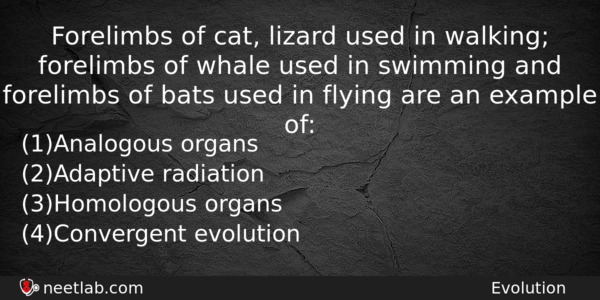| ⇦ | 
| ⇨ |
Forelimbs of cat, lizard used in walking; forelimbs of whale used in swimming and forelimbs of bats used in flying are an example of:
Options
(a) Analogous organs
(b) Adaptive radiation
(c) Homologous organs
(d) Convergent evolution
Correct Answer:
Homologous organs
Explanation:
Organs which have a common fundamental anatomical plan and similar embryonic origin whatever varied functions they may perform are regarded as homologous organs. For example the flippers of a whale, a bats wing, fore-limb of a horse a bird’s wing and forelimbs of a horse a birds wing and forelimbs of human are structurally as well as functionally different.
Related Questions: - DNA fragments generated by the restriction endonucleases in a chemical reaction
- Epinephrine is
- Which of the following is not correct xerophytes
- The term systematics refers to
- When micropyle, chalaza and funicle are in a straight line, the ovule is called
Topics: Evolution
(132)
Subject: Biology
(4253)
Important MCQs Based on Medical Entrance Examinations To Improve Your NEET Score
- DNA fragments generated by the restriction endonucleases in a chemical reaction
- Epinephrine is
- Which of the following is not correct xerophytes
- The term systematics refers to
- When micropyle, chalaza and funicle are in a straight line, the ovule is called
Topics: Evolution (132)
Subject: Biology (4253)
Important MCQs Based on Medical Entrance Examinations To Improve Your NEET Score
18000+ students are using NEETLab to improve their score. What about you?
Solve Previous Year MCQs, Mock Tests, Topicwise Practice Tests, Identify Weak Topics, Formula Flash cards and much more is available in NEETLab Android App to improve your NEET score.
Share this page with your friends

Leave a Reply